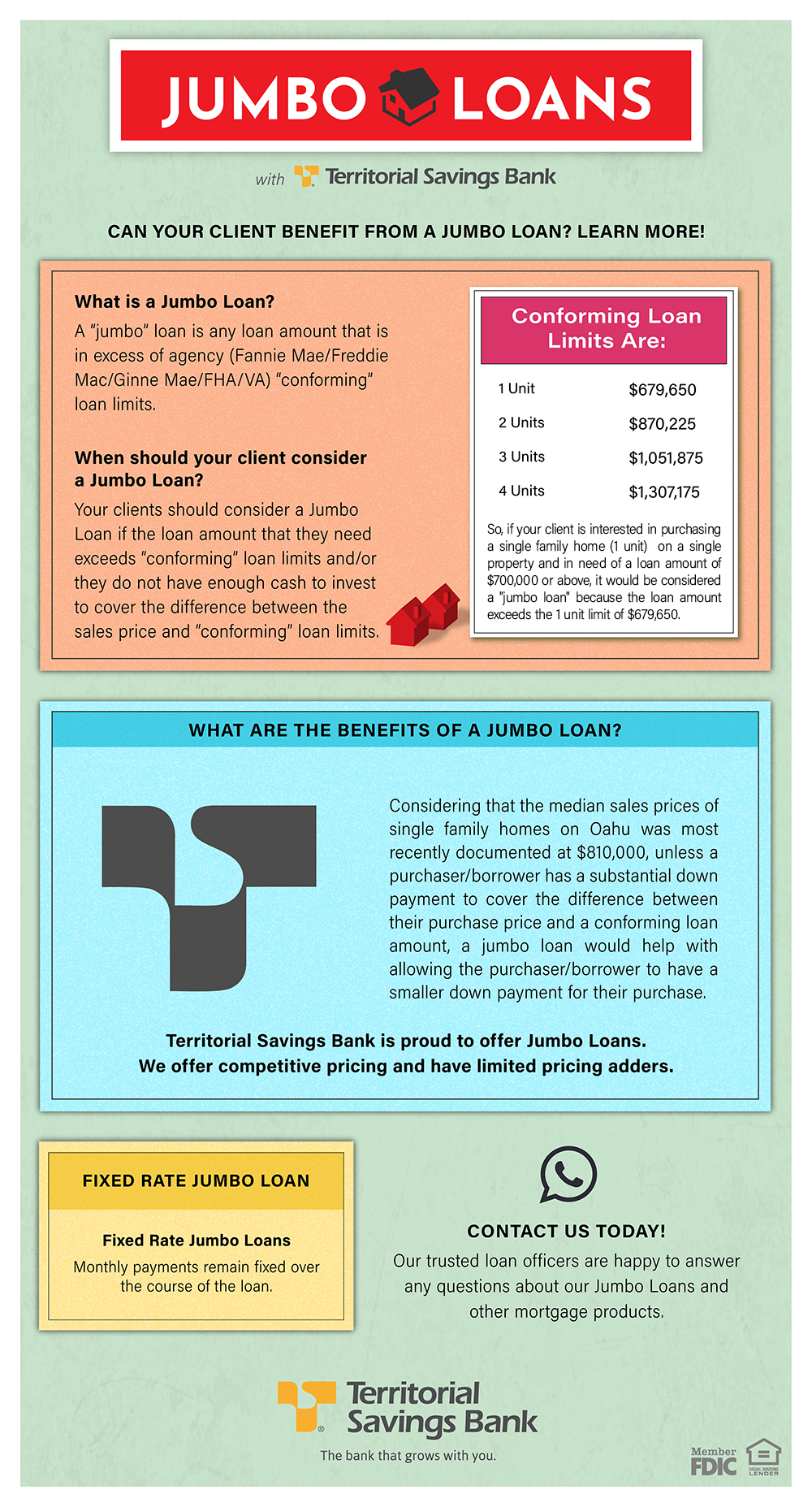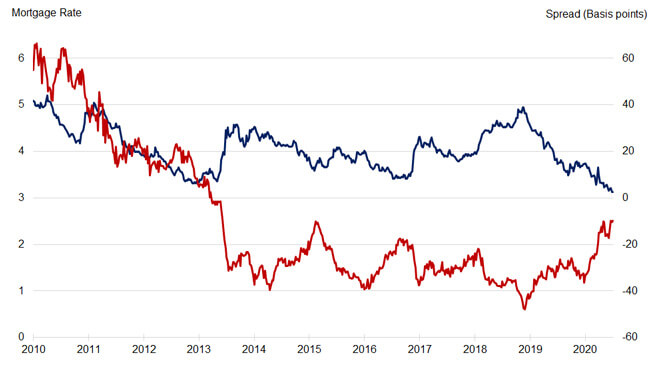Jumbo Loan: Funding Options for High-Value Residence
Jumbo Loan: Funding Options for High-Value Residence
Blog Article
Discovering the Perks and Features of Jumbo Loans for Your Following Home Purchase Choice
As the real estate market progresses, recognizing the intricacies of big car loans comes to be significantly relevant for potential homebuyers considering high-value properties. To fully appreciate just how jumbo finances can affect your home purchase approach, it is essential to discover their key features and advantages in better information.
What Is a Jumbo Loan?

Jumbo loans are usually used by buyers seeking to acquire high-value homes or homes in costly markets. jumbo loan. Given the bigger amounts borrowed, lending institutions commonly enforce more stringent credit rating needs, including higher credit report, reduced debt-to-income ratios, and bigger deposits. The passion rates on big financings may be slightly more than those on conforming financings, showing the raised danger for lending institutions
Furthermore, the authorization process for a jumbo lending can be a lot more complex and lengthy, as loan providers need extensive documents to evaluate the consumer's monetary security. Recognizing these subtleties is important for potential home owners considering a jumbo finance for their residential property financing needs.
Secret Benefits of Jumbo Fundings
One significant benefit of big loans is their capacity to finance higher-priced properties that exceed conforming lending limitations. This attribute makes them an eye-catching option for purchasers wanting to acquire high-end homes or residential properties in high-cost locations where prices generally exceed standard car loan thresholds.
Furthermore, big finances typically come with adaptable terms and affordable rates of interest, permitting consumers to customize their funding to suit their special monetary circumstances. jumbo loan. This versatility can include alternatives for adjustable-rate mortgages (ARMs) or fixed-rate lendings, providing buyers with the capacity to handle their month-to-month repayments according to their preferences
Another benefit is that jumbo fundings do not require private home mortgage insurance coverage (PMI), which can dramatically minimize the general cost of the car loan. With PMI commonly being a significant cost for traditional lendings with reduced deposits, avoiding it can cause significant savings in time.
Furthermore, debtors of jumbo financings generally have accessibility to greater lending quantities, enabling them to purchase buildings that fulfill their way of living needs. This accessibility empowers buyers to act decisively in competitive realty markets, securing their desired homes better. On the whole, jumbo financings supply important advantages for those seeking to finance premium properties.
Eligibility Needs for Jumbo Car Loans
Jumbo fundings include specific eligibility demands that possible borrowers have to meet to secure funding for high-value properties. Unlike conventional financings, which have set limitations based upon the adapting car loan restrictions developed by government-sponsored entities, big lendings exceed these limits, necessitating stricter standards.

Furthermore, big fundings frequently necessitate a substantial down repayment, often varying from 10% to 20% of the acquisition cost, depending on the lending institution's policies and the consumer's financial situation. Cash money reserves are additionally thought about, with numerous lenders anticipating consumers to have numerous months' well worth of mortgage payments readily offered. Lastly, comprehensive documents of earnings and assets will certainly be required to support the loan application. Meeting these qualification needs can position customers positively in securing a jumbo financing for their desired building.
Contrasting Jumbo Financings to Standard Finances
Understanding the distinctions between jumbo car loans and traditional loans is crucial for buyers browsing the premium genuine estate market. Big financings go beyond the adapting funding limitations set by the Federal Real Estate Finance Agency (FHFA), which implies they are not eligible for purchase by Fannie Mae or Freddie Mac. This results in various underwriting criteria and needs for borrowers.
In contrast, conventional lendings generally stick to these limitations, allowing for a much more structured authorization process. Big fundings commonly need stricter credit report scores, larger deposits, and greater economic reserves. As an example, while a traditional financing could require a down settlement of just 3% to 5%, big fundings generally demand a minimum of 10% to 20%.
Passion rates on big lendings might differ from those of standard car loans, often being somewhat greater due to the boosted risk loan providers assume - jumbo loan. Nevertheless, the possibility for significant financing can be useful for buyers looking for deluxe homes. Ultimately, understanding these distinctions allows property buyers to make informed decisions, aligning their financing choices with their one-of-a-kind purchasing needs and economic scenarios
Tips for Protecting a Jumbo Loan
Securing a jumbo car loan needs cautious preparation and prep work, as lending institutions often impose stricter demands compared to traditional financings. To boost your possibilities of authorization, begin by inspecting your credit report and addressing any issues. A score of 700 or higher is typically liked, as it shows credit reliability.
Following, collect your monetary documentation, consisting of tax get more obligation returns, W-2s, and financial institution declarations. Lenders normally need comprehensive proof of revenue and properties to examine your capability to settle the car loan. Maintaining a reduced debt-to-income (DTI) proportion is likewise essential; go for a DTI listed below 43% to boost your application's competitiveness.
Additionally, think about making a larger deposit. Lots of loan providers seek a minimum of 20% down for jumbo lendings, which not just decreases your finance amount but additionally signals monetary stability. Involving with an experienced home loan broker like it can supply very useful insights into the process and help you browse numerous lending institution alternatives.

Final Thought
In summary, jumbo finances existing considerable advantages for buyers seeking homes that go beyond traditional car loan limitations. With affordable rates of interest, flexible terms, and the lack of personal home loan insurance, these financings can lead to substantial price financial savings. Possible consumers have to browse more stringent eligibility requirements to get beneficial terms. Detailed understanding of both the requirements and advantages related to big loans is essential for making educated home acquisition decisions in a competitive actual estate market.
The passion rates on jumbo car loans might be a little greater than those on adapting fundings, mirroring the increased risk for lending institutions.
While a conventional funding may require a down settlement of as little as 3% to 5%, jumbo financings typically require a minimum of 10% to 20%.
Interest rates on big car loans might vary from those of conventional financings, typically being a little higher due to the boosted danger lenders presume.Safeguarding a jumbo funding needs mindful planning and preparation, as lending institutions commonly impose stricter demands contrasted to conventional finances. Numerous lending institutions look for at least 20% down for jumbo finances, which not just minimizes your loan amount yet additionally signals financial stability.
Report this page